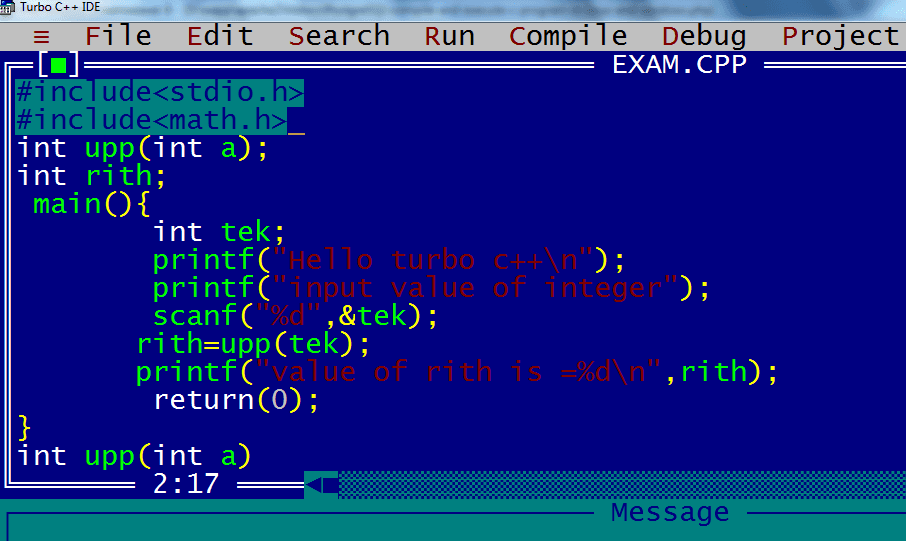Compile C Program In Dos How To Change
I know that everyone uses an IDE nowadays, but I just find it simpler to write my code in notepad, compile it using a command prompt command, and run it from there too. At least that works for Java and Python.
Question: I would like to understand the basics of how to write, compile and execute a C program on Linux OS.Can you explain it with a simple example? Answer: Last week we reviewed how to write C program on Unix OS. In this article, let us review very quickly how to write a basic Hello World C program and how to compile.cc program on Linux or Unix OS. Open the Command Prompt from the Start Menu. You can also press Win + R, then type cmd.exe into the Run field. Use the cd command to change your working directory to the directory containing your Java program.Mine is saved in my “Scripts” folder, but you can save your file anywhere you’d like on your system.


I've tried to get my head around how to do that with C, and haven't been able to find anything good. Is there any compiler (like Java's JDK) that I can stick into my path and use the C equivalent of javac and java to run and compile my code from CMD?Note: please don't post answers and comments about how IDEs are better - I know they are. I'm just used to doing it the old way:D. It depends on what compiler you're using.For example, if you are using Visual C.NET 2010 Express, run Visual C 2010 Express Command Prompt from the start menu, and you can simply compile and run the code. cl /EHsc mycode.cpp mycode.exeor from the regular command line, you can run vcvars32.bat first to set up the environment. Alternatively search for setvcvars.cmd (part of a FLOSS project) and use that to even locate the installed VS and have it call vcvars32.bat for you.Please check your compiler's manual for command lines.
If you're running Windows then make use of this: g -o program program.cppg is the name of the compiler and -o is the option needed for creating a.o file. Program (without.cpp suffix) is the exe file and program.cpp is your source file that you want to compile. G -o program program.cpp&program.exeUse this shortcut to run the.exe file of the program. This may run in Ubuntu but you may have to use.out suffix instead of.exe. Use this handy batch script I made to execute your programs on Windows: @echo off&&clsset /p pathName=Enter The Path where the file is located:%=%cd%pathName%REM set /p exec=Enter The Name of the executable you want to make:%=%set /p file=Enter The Name of the file you want to compile:%=%g -o%file%%file%.cpp%file%.exesave it as cppExecutor.batAlso you could use the following commands on Unix (Linux and Mac) OS: CC program.ccIf you want to use gcc: gcc -o program program.cppWith the shortcut: gcc -o program program.cpp&program.exe. I really don't see what your problem is, the question is rather unspecific.

Compile C Program Gcc
Given Notepad I assume you use Windows.You have so many options here, from the MinGW (using the GCC tool chain and GNU make) to using a modern MSVC. You can use the ( ddkbuild.bat/.cmd or plain build.exe), the ( nmake.exe), other tools such as and, or msbuild that comes with MSVC and the Windows SDK.I mean the compiler names will differ, cl.exe for MSVC and the WDK and Windows SDK, gcc.exe for MinGW, but even from the console it is customary to organize your project in some way. This is what make and friends were invented for after all.So to know the command line switches of your particular compiler consult the manual of that very compiler. To find ways to automate your build (i.e.
The ability to run a simple command instead of a complex command line), you could sift through the or pick one of the tools I mentioned above and go with that.Side-note: it isn't necessary to ask people not to mention IDEs. Most professional developers have automated their builds to run from a command line and not from within the IDE (as during the development cycle for example), because there are so many advantages to that approach. Sure, it's how most compilers got started. Is probably the most popular (comes with most flavors of.nix).
Syntax is just gcc mysourcecode.cpp, or gcc -o myexecutable.exe mysourcecode.cpp. It gets more complicated, of course, when you have multiple source files (as in implementation; anything #included works automatically as long as GCC can find it).appears to be a version of GCC for Windows, if that's what you're using. I haven't tried it though.Pretty sure most IDEs also include a command line interface.
I know Visual Studio does, though I have never used it.





